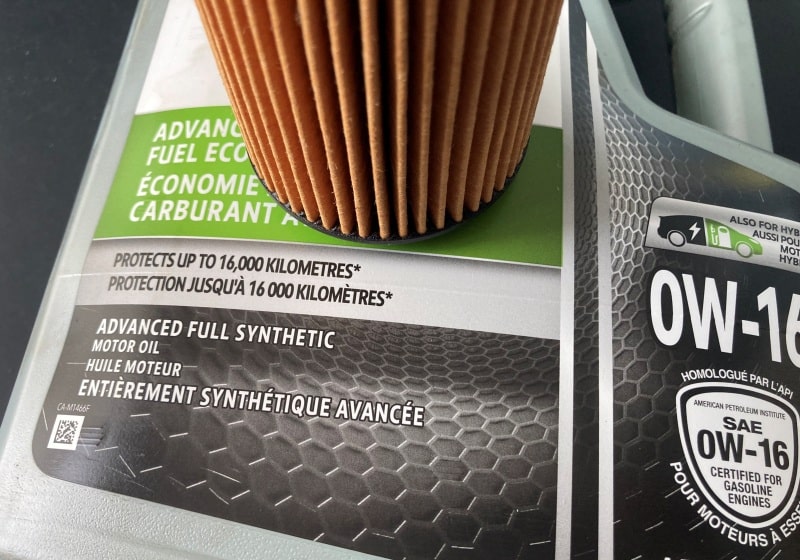Synthetic Oil vs Regular Oil: Which One to Use?
Synthetic Oil vs Regular Oil: Which One to Use?
What is synthetic oil?
Synthetic engine oils are man-made products, mostly artificial oil so to speak. Synthetic oil is produced either using fully synthetic compounds or made from base oil but with a very high degree of refinement. Regular oil on the other hand, is just what it says it is, oil pumped from underground and traditionally refined.
Both synthetic and regular oils contain additives which make them stable at high temperatures and help clean engine sludge and contamination.
Price wise synthetic oil cost about twice as much as regular oil.
Detail on: What is Synthetic Oil
Advantages of Synthetic Oil
Main advantage of synthetic oils vs regular oil is molecular composition. Molecular uniformity composition of synthetic oil gives an advantage at lubricating and resisting high temperatures. Especially in cars with a turbo engines where oil is used as a coolant of high temperature turbochargers.
Impurities on synthetic oil are kept to a minimum due to high degree of refinement (hence, expensive). As opposed to synthetic oil, regular oil has a lower degree of refinement and contains more contaminants (sulfur, wax, minerals, etc), hence cheaper price.
Stability at high temperatures is quite a bit higher than regular oil, leading to longer engine lifespan and higher performance. Also, Synthetic oil absorb less moisture from environment than regular oil, water contamination is kept to a minimum. For example, if you do not drive you car much and change engine oil once a year then you should use synthetic oil. As time passes, standing oil will collect moisture for humidity leading to water contamination. Using synthetic oil will keep water contamination to a minimum.
Engine Oil Viscosity
Viscosity is another plus for synthetic oil. Being more stable at low and high temperatures translates to more stable viscosity which provides better lubrication under all circumstances.Viscosity stability is especially important at cold engine start up when engine oil has drained and collected in oil pan (lets say overnight). Synthetic oil with its stable viscosity in low temperatures will raise engine oil pressure to optimal parameters faster than regular oil reducing engine wear on cold start up.
Synthetic oil contains higher amount of additives which help preserve oil lubrication and increase resistance to high temperatures. However, this is arguable as additives are added ingredients and manufacturers use different additives.
Some regular oils might contains same amount and type of additives just as synthetic oil does. Anyways, in general oil manufacturers will add higher quality and higher amount of additives to their expensive or premium products, synthetic oil in this case.
Synthetic Oil Blends
Synthetic Blend or Semi Synthetic oil is a blend of synthetic and regular oil, and is mainly just a method to increase sales.
Semi Synthetic oil is meant to offer the best of both worlds: 1) low price of regular oil, which it doesn’t as it is quite a bit more expensive than regular oil. 2) Protection of synthetic oil, which it doesn’t as it has mainly regular oil in it.
It is basically a marketing scheme designed to make money for oil manufacturers praying on people who have no experience and think they are getting synthetic oil at a lower price. It does that by adding word “Synthetic” on packaging while real percentage of synthetic oil is minuscule and have zero benefits in real world.
Synthetic blends have about 25-30% of synthetic oil with rest being just regular oil. There is absolutely no reason to buy and use synthetic blend, unless you find it on sale for same price as regular oil. Ether use full synthetic oil or regular oil, do not waste money on a marketing gimmick.
Should I Use Synthetic Oil?
Synthetic oil offers better protection, will last longer and will lubricate better, thats much is for sure. One small problem is: price. Synthetic cost at least double the money of regular oil. If price was the same, then you should use synthetic oil only, but price is not the same. Then what you should do to get most protection for as little as possible?
Turbocharged Engines
Well, lets make one thing clear: if you drive a turbocharged car you should use exclusively synthetic oil only, even if manufacturer recommends regular oil. Turbochargers operate at high temperature and are known to “cook” engine oils. That means turbocharged engines are more prone to sludge and contamination due to oil break down due to high temperatures.
Sludge kills engines by blocking oil passages and preventing oil to reach engine bearings leading to very expensive repairs or most commonly complete engine destruction. Since turbocharges nowadays have become most prevalent engines due to environmental regulations, you should become familiar on how to properly maintain and make them last longer.
Detains on: How to Maintain Turbocharged Engine.
Naturally Aspirated Engines
As far as naturally aspirated engines go, you should use manufacturer oil type and viscosity recommendations. If manufacturer recommends regular oil vs synthetic oil, then use regular oil. If manufacturer recommends synthetic oil then use synthetic oil.
Oil requirement will be printed on engine oil cap and on owner’s manual. It will indicate oil viscosity and type recommended for your engine. In some cases though, car manufacturers will even recommend a specific brand of oil (Castrol, Mobil 1, etc). Don’t bother with that recommendation, its only marketing. Find whatever quality oil is on sale or whatever your mechanic recommends. Oil is oil and almost all big oil producers have very similar or almost identical quality.
Oil Change Intervals
This is the most important part, much more important that oil quality. It is definitely better and safer to use cheap regular oil and change it at 5,000 miles or 7,000 km than use expensive synthetic oil at 10,000 miles or 16,000 km intervals.
Recently synthetic oil manufacturers and car manufacturers are recommending 16,000 km or 10,000 miles oil changes, which is completely unrealistic. Bear in mind, manufacturers are liable only for warranty period, and 10,000 miles oil change intervals will not cause any engine damage for first 3 to 5 years.
However, after that period sludge will start to cause engine problems and engine longevity will suffer greatly…and guess what, warranty period has run out. Now, you will have to pay yourself and car manufacturers will very happily sell you a new engine.
Whatever oil you use, keep oil changes at 5,000 miles mark for best engine performance and long lifespan. Oil change intervals are what primarily determines how long an engine will last, oil type or quality comes second.
More on: Oil Change Intervals.
Switching from Regular to Synthetic Oil
Switching from regular vs synthetic oil on high mileage cars won’t make your engine last longer or have any benefits. You just wasted your money. If your car has been running fine on regular oil for 100k miles or more, changing to synthetic oil will have very little effect.
Although sometimes, you might even get oil leaks when changing from regular oil to synthetic oil. Synthetic oil has uniform and smaller molecular composition compared to regular oil and it goes places regular oil could not go. It might go thru old gaskets and seals causing leaks. This is not to say will happen every time when changing from regular to synthetic oil, but sometimes it surely does.
If you have been using regular oil then keep using regular oil with oil change intervals no longer than 5,000 miles or 8,000km. Your engine be fine with regular oil and will last just as long. There is no need to waste money on unnecessary expensive oil.
While quality of oil is important (you don’t want to buy some recycled oil cheap junk) on the other hand most important is time. How long you leave oil inside the engine. Oil contaminates and in return will contaminate piston oil rings, within few years your engine will start to burn oil as oil rings will be seized. Change engine oil on shorter intervals, your wallet will be rewarded in long run.
Automatic transmission fluid: Transmission Flush vs Drain Refill.
(If you are also looking for a fast and easy solution to sell your car, more here on “How To Sell Your Car Fast In Ontario” )
Comments: If you have any questions or suggestions related to this post or Used Car Toronto in general, don’t hesitate to use comment section below.













